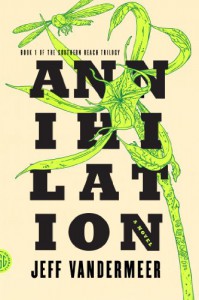Familiar Diversions
I'm a librarian who loves anime, manga, and reading a wide variety of genres.
Currently reading
Annihilation by Jeff Vandermeer

I'm pretty sure I bought my copy of Annihilation sometime late last year. I probably wouldn't have read it until months or even years later, except I saw a preview of the movie and was intrigued. I wanted to read the book before the movie came out.
The book begins with the start of the latest expedition into the mysterious Area X. The twelfth expedition is made entirely up of women: a psychologist (their leader), a biologist (the book's narrator), a surveyor, and an anthropologist. There was also supposed to be a linguist, but she opted not to go the Area X, or was prevented from going.
Unexpected things happen right at the very start of the expedition. Prior to going into Area X, everyone was rigorously trained in topics relating to their field of study, as well as the known geography of Area X. However, one of the first things they come across is a tower that was most definitely not on the map they were shown. They have a choice: they can either explore the tower, or they can forge ahead and check out whatever the previous expedition left behind at the lighthouse (which was on the map) and the surrounding area. They opt to go to the tower, which turns out to have writing on its walls, made out of some kind of plants. After their first trip into the tower, the expedition begins to rapidly fall apart.
I'm not sure what to make of Annihilation. It was a compelling read, but fairly early on I realized it reminded me strongly of a book that I disliked and that, on the surface at least, was completely different. In Kobo Abe's The Box Man, a man (or multiple men - it's unclear) decides to exist inside a box that covers him from his head to his hips. Abe starts off by describing everything in excruciating detail, from the way in which the Box Man constructed his box to what it's like to live as a Box Man. As the Box Man encounters other people, the story becomes increasingly surreal, to the point that it's difficult to tell which of the things he describes have any connection at all to reality.
I could see the Box Man in the way the biologist described the world around her. The first half of the book was devoted to the tower, which, due to an accident, the biologist was able to see in ways that others in her expedition, except maybe the psychologist, couldn't. It was tough to tell whether the text written on the walls and the other things she saw would ever actually mean something, but I was intrigued enough to keep reading. As the expedition began to fall apart, I wanted to know what the psychologist knew that the others didn't, and what the expedition's goal was.
I could also see the Box Man in the things the biologist discovered in the tower and later, during her trip to the lighthouse. Thankfully, Annihilation was less surreal than The Box Man, but I still wasn't happy when it turned out to have almost as ambiguous an ending.
I don't want to say too much for fear of including major spoilers, but a few things popped into my head as I was reading. First, considering what the biologist's husband was like after he came back from Area X (he was part of the eleventh expedition - not too much of a spoiler, I think) and what eventually happened to him, I don't understand why the biologist never asked what the little black boxes the expedition members had been given were measuring. You'd think someone would have demanded to know, unless anyone with a healthy level of concern about things that could kill them was rejected from becoming part of an expedition.
Second, cross-disciplinary knowledge would have been helpful, and yet the members of the expedition seemed to know very little that wasn't directly related to their fields of study. It was a frustrating. I could believe that the biologist was that hyper-focused, but I'd have thought one of the others would have branched out a bit more. The closest we got was the surveyor, who had a bit of military knowledge.
Third, the biologist tended to spin elaborate theories out of very little. For example, her observation of a slime trail that led downward into the tower, plus evidence that the writing in the tower was fresher further down, prompted her to come up with elaborate theories about the creature she believed was doing the writing. To be fair, even she eventually realized that she was ignoring the possibility that the creature was intelligent and that there might be meaning behind the words. Of course, even that theory assumed that the creature, which she hadn't even seen yet, was writing those words.
In the end, this book left me feeling underwhelmed, and just a little annoyed that the ending held almost no answers. Area X intrigued me, so I might continue on, but I'm a little worried that the next two books will be just as ambiguous as the first. There are quite a few questions I'd like some answers to (like why a couple different beings could have killed the biologist and yet were somehow forced not to), but I'm not sure I trust the rest of the trilogy to give me those answers.
(Original review posted on A Library Girl's Familiar Diversions.)
 2
2












